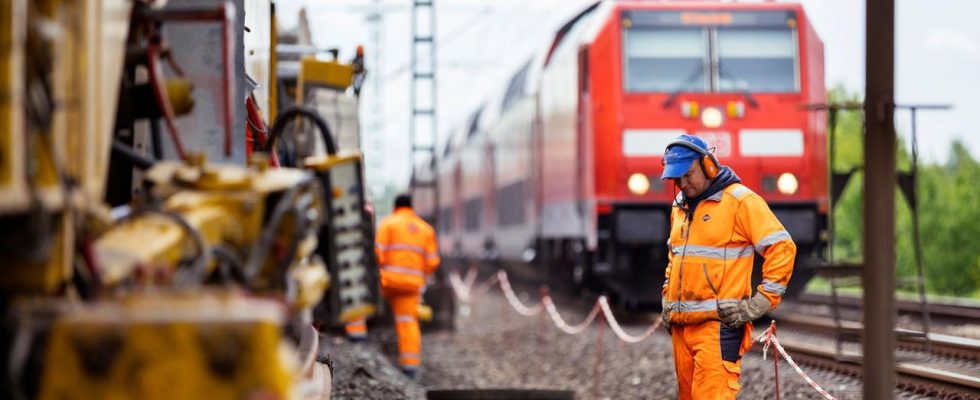Train cancellations, rail replacement services: everyday life on German rails. The number of track construction sites is increasing rapidly. In view of the many dilapidated routes, this is also sorely needed. But the DB Group often seems overwhelmed by this.
Around half of all regional trains in Germany are operated by private companies. For example, the ODEG operates 16 regional lines around Berlin and Brandenburg with 80 trains, including the RE1 between Frankfurt Oder and Magdeburg. Because Deutsche Bahn (DB) is renovating this route, rail replacement services were organized months in advance for 40 kilometers of the route.
But things turned out differently, as Roland Pauli, Managing Director of ODEG reports: “In the short term, it turned out that so many other construction sites were planned on other parts of the route that no meaningful traffic was possible there either. Then almost 80 kilometers were closed and we only had one week to organize the 50 additional buses that were needed, to conclude contracts with the companies and to inform customers.” The chaos for the passengers was correspondingly large. Similar conditions can be found nationwide on a regular basis.
“Really no sign of acceleration”
The DB itself recently published in its track condition report: The condition of many often outdated routes in Germany is worse than in neighboring countries. Therefore, the private train operators also welcome growing construction activity. But they complain that DB is overstrained in terms of personnel and organization. The DB itself said on request: “The construction workload is growing massively. (…) We regret these cases and are working on further improving our processes.”
Federal Transport Minister Volker Wissing, FDP, recently approved an additional 45 billion for the rehabilitation of old routes – for three years. And this is exactly where the industry sees a crucial problem: there is a lack of personnel and equipment to build so much more so quickly. Not just at DB itself. Which of the track construction companies operating in Germany would buy new staff and new machines for such a brief flash in the pan?
Long-term planning is necessary, such as a permanently invested infrastructure fund over decades. The “Rail Acceleration Commission” set up by the Federal Minister of Transport a year ago called for something like this months ago. One of those involved: Tobias Heinemann, President of the Association of Passenger Railways, MOFAIR. He complains: “Unfortunately, I have to say that there is really nothing to be seen in the implementation of this topic of acceleration.”
New strategy with risks and side effects
Freight train operators are almost even worse off. Private companies now have a significantly larger market share than DB itself. During track construction work, their trains have to take detours, partly on non-electrified routes, for which it is then time-consuming and expensive to switch to diesel locomotives – with travel times that a train driver can no longer legally manage can be and force the use of a second train driver.
Those affected fear further deterioration due to a new DB construction strategy. In the future, they no longer want to block individual tracks on multi-track routes. but to completely renovate hundreds of kilometers of main line because that is more efficient. But then the entire detour traffic has to travel for months on routes that are not designed for so much traffic. Freight trains then often stand for hours in front of individual signals to wait for gaps.
The Association of Freight Railways therefore demands: If it is clear today that a main corridor will be completely closed in a few years, DB should expand the detours so that they can also accommodate traffic. This also makes sense in the long term, because disruptions also occur regularly on renovated routes, diversions are necessary – and well-developed alternative routes could also accommodate growing traffic in the future. The DB states that such diversions would be strengthened by cutting back vegetation, rail loops and similar measures. But that has nothing to do with what the freight train operators say would be necessary.
Where is the promised reform?
But why is DB thrifty here? While long-distance traffic and freight trains have only been making losses for many years, the ailing network of all things brings in billions in profit. After all, train operators pay good money for every kilometer – more than DB spends on the routes. Experts have long been demanding that the network be converted into an independent, non-profit state company.
Something similar was also decided in the traffic light coalition agreement. The network is to remain part of DB AG, but largely independent and without profit transfer – from the beginning of 2024. Legislation for this has not yet begun. Is it actually the usual hearing of the associations involved and other affected parties? So far none. The Federal Ministry of Transport announced that the restructuring within DB was planned without legal measures. It will be implemented as planned by the end of this year.
Neele Wesseln, Managing Director of NEE, the Association of Private Freight Railways, remains skeptical: “Our members handle 60 percent of German rail freight traffic. Nevertheless, Minister Wissing has not yet spoken to our members. Instead, he speaks to DB representatives almost every week also about the planned restructuring. If things continue like this, we cannot imagine that a solution that makes sense for us will be implemented there.”

